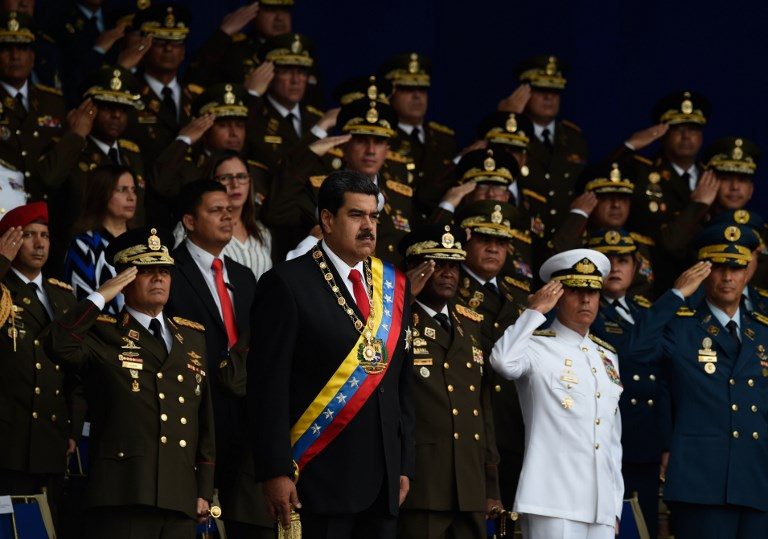SUMMARY
This is AI generated summarization, which may have errors. For context, always refer to the full article.

CARACAS, Venezuela (UPDATED) – Venezuelan President Nicolas Maduro on Monday, August 6, renewed his accusation against his Colombian counterpart, blaming him for what Caracas has called a drone “assassination” attempt on the Socialist leader over the weekend.
In a video posted on Twitter shortly before midnight, the 55-year-old said police and the military had captured some of the conspirators and were now hunting the masterminds.
“There is sufficient evidence of the participation of the outgoing Colombian government of President Juan Manuel Santos,” he added, promising to release proof “in the next few hours.”
The allegation has worsened already fraught ties between Caracas and Bogota.
Santos, who hands over power to elected successor Ivan Duque on Tuesday, August 7, has categorically denied it.
A live broadcast of the incident on Saturday, August 4, on Venezuelan state television showed Maduro interrupted in mid-speech by an explosion and looking up in confusion.
Dozens of soldiers on parade are then seen breaking ranks and running away in panic.
Maduro and his government said the president had been targeted by two flying drones carrying explosives. But details of the incident remain unclear, with conflicting information coming from various sources.
The Maduro administration said Colombia had collaborated on the attack with the “ultra far-right” Venezuelan opposition, and it was financed by unnamed figures in the US state of Florida.
No evidence was given to support the allegations. Thousands of exiled Venezuelans live in Colombia and in Florida.
Maduro had been expected to address his supporters – most of them workers – who marched through Caracas in what would have been his first public appearance since Saturday’s incident.
But he failed to show. The communications ministry did not explain his absence.
“We had hoped to see him today. But we imagine he didn’t come out for security reasons,” said one supporter, 36-year-old Margot Sivira.
Linda Estrada, 48, added: “They aren’t going to give them the pleasure of killing him.”
Suspects ‘identified’
Maduro’s critics said they feared the Venezuelan government would use the attack to step up repression of the opposition and dissidents.
Venezuelan Attorney General Tarek William Saab told a news conference on Monday that several suspects were in custody and authorities would track down all those who conspire against public peace.”
He called the drone attack, in which 7 soldiers were said to be wounded, “an attempted massacre.”
The attorney general added that two of the suspects were “caught in the act” guiding one of the drones from a car close to the parade.
Interior Minister Nicolas Reverol said Sunday, August 5, that 6 suspects had been arrested.
He said two drones had been used, each carrying a kilogram (2.2 pounds) of C4 explosive.
No drones could be seen in the broadcast of the event, which was cut moments after the soldiers were seen scattering away from where Maduro was standing flanked by military chiefs and his wife.
An unauthenticated statement from a rebel group calling itself the “National Movement of Soldiers in T-Shirts” claimed responsibility.
Maduro and his allies insist it was a drone assassination bid. Bolivia, Cuba, Iran, Russia, Syria and Turkey condemned the incident.
Persecution feared
Maduro, a former bus driver who took over the reins from his mentor Hugo Chavez upon the latter’s death to cancer in 2013, has been ruling in increasingly autocratic fashion with military support.
He controls almost all the country’s institutions, and has used the supreme court, electoral authorities and a new super-legislative body, the Constitutional Assembly, to sideline the opposition-run parliament, the National Assembly.
Although he won a new 6-year term in controversial snap elections boycotted by the opposition, Maduro remains widely reviled for presiding over a collapsing economy.
Inflation this year is projected to reach as high as one million percent, according to the International Monetary Fund. Oil exports – a vital money-earner for a country sitting atop the world’s largest crude reserves – have declined sharply.
Venezuela’s currency, the bolivar, is practically worthless and food and medicine are extremely scarce, prompting hundreds of thousands of Venezuelans to flee abroad.
The country is largely isolated internationally and is subject to US sanctions that greatly degrade Caracas’s capacity to raise credit.
Maduro regularly accuses the “imperialist” United States of plotting coups against him and waging “economic war” on Venezuela. – Rappler.com
Add a comment
How does this make you feel?





There are no comments yet. Add your comment to start the conversation.